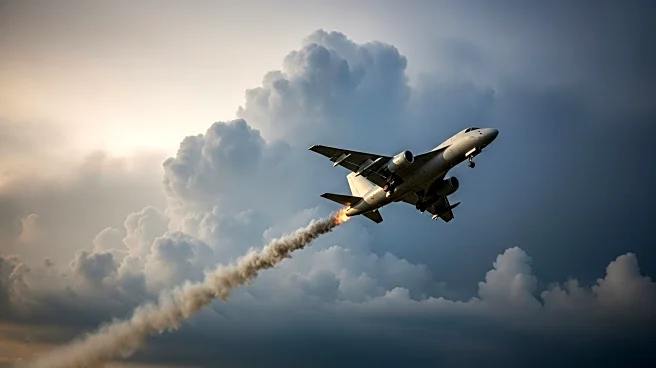What is the story about?
What's Happening?
Russian President Vladimir Putin has publicly acknowledged that Russian air defenses were responsible for the downing of an Azerbaijani passenger aircraft in December 2024, resulting in the deaths of 38 people. This admission was made during a meeting with Azerbaijan's President Ilham Aliyev in Dushanbe, Tajikistan, where both leaders were attending a regional summit. The Azerbaijan Airlines jet crashed in Kazakhstan's Aktau while en route from Baku to Grozny, Chechnya. Despite the pilots' heroic efforts, 38 individuals perished, while 29 survived. Azerbaijani government sources had previously confirmed that a Russian surface-to-air missile caused the crash. The missile, fired from a Pantsir-S air defense system, exploded near the aircraft during drone activity above Grozny, leading to the tragedy. The damaged plane was denied emergency landing at Russian airports and was directed to Kazakhstan, with its GPS systems jammed during the flight.
Why It's Important?
This admission by President Putin marks a significant development in international relations between Russia and Azerbaijan. The incident had strained diplomatic ties, with Azerbaijan preparing to file lawsuits in international courts against Russia. The acknowledgment of responsibility could pave the way for compensation to the victims' families and potentially ease tensions between the two nations. The event highlights the risks associated with military operations near civilian airspace and underscores the importance of accountability in international incidents. The broader implications may affect regional security dynamics and influence future diplomatic engagements between Russia and neighboring countries.
What's Next?
Following Putin's admission, Azerbaijan may proceed with its planned legal actions against Russia in international courts. The compensation promised by Putin could be a step towards reconciliation, but the legal proceedings might still unfold, potentially impacting Russia's international standing. The incident may prompt discussions on airspace safety and military protocols to prevent similar occurrences. Stakeholders, including international aviation bodies and regional governments, might advocate for stricter regulations and transparency in military operations near civilian areas.
Beyond the Headlines
The incident raises ethical questions about military accountability and the protection of civilian lives during military operations. It also highlights the challenges in balancing national security interests with international diplomatic relations. The long-term impact could lead to shifts in regional alliances and influence how countries address military mishaps involving civilian casualties. The case may serve as a precedent for handling similar incidents in the future, emphasizing the need for clear communication and responsibility in international affairs.















